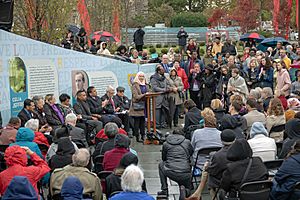Social equity facts for kids

Social equity is about making sure things are fair and just for everyone in society. It means that all people should have equal chances and be treated fairly, no matter who they are or where they come from. Since the 1960s, this idea has been used in many areas, like education and how public services are managed.
Contents
What is Social Equity?
Social equity means treating people fairly and making sure everyone has what they need to succeed. It's about making sure that public services, like schools or healthcare, are available to everyone equally. This also means understanding that some groups of people might have faced unfair treatment in the past. To be truly fair, we need to consider these past and present differences.
Social Equity in Government
The idea of social equity became more important in the United States during the 1960s. This was a time when people were paying more attention to civil rights and the unfair treatment of different racial groups.
The National Academy of Public Administration, which is a group that studies how government works, says that social equity means:
- Managing all public services fairly and justly.
- Making sure public services and policies are given out fairly.
- Working to make policies that are fair and just for everyone.
In 1968, a thinker named H. George Frederickson said that social equity should be a main goal for people working in government. He believed that government workers sometimes forgot that people are different and have different needs. He wanted social equity to be as important as saving money (economy) and doing things efficiently (efficiency).
Fairness for Everyone
When we talk about social equity in government, it's very important to think about racial equality. This means believing that all human races are equal and that people of different races should have the same opportunities in society. Many people in the United States believe that racial equality will eventually happen.
Respecting Different Beliefs
Social equity also includes protecting people's religious freedom. In the U.S., laws protect individuals, no matter what their religious affiliation or practices are. For example, a law called 42 U.S.C. sect. 2000e(j) helps protect employees. It says that employers must try to allow their workers to follow their religious practices and celebrations, unless it causes a major problem for the business. This law helps make sure people can practice their religion freely at work.
See also
 In Spanish: Equidad social para niños
In Spanish: Equidad social para niños
- Affirmative action
- Diversity, equity, and inclusion
- Educational equity
- Identity politics
- Intersectionality
- Reverse discrimination
- Social equality
- Social justice
- Social privilege
 | Janet Taylor Pickett |
 | Synthia Saint James |
 | Howardena Pindell |
 | Faith Ringgold |

